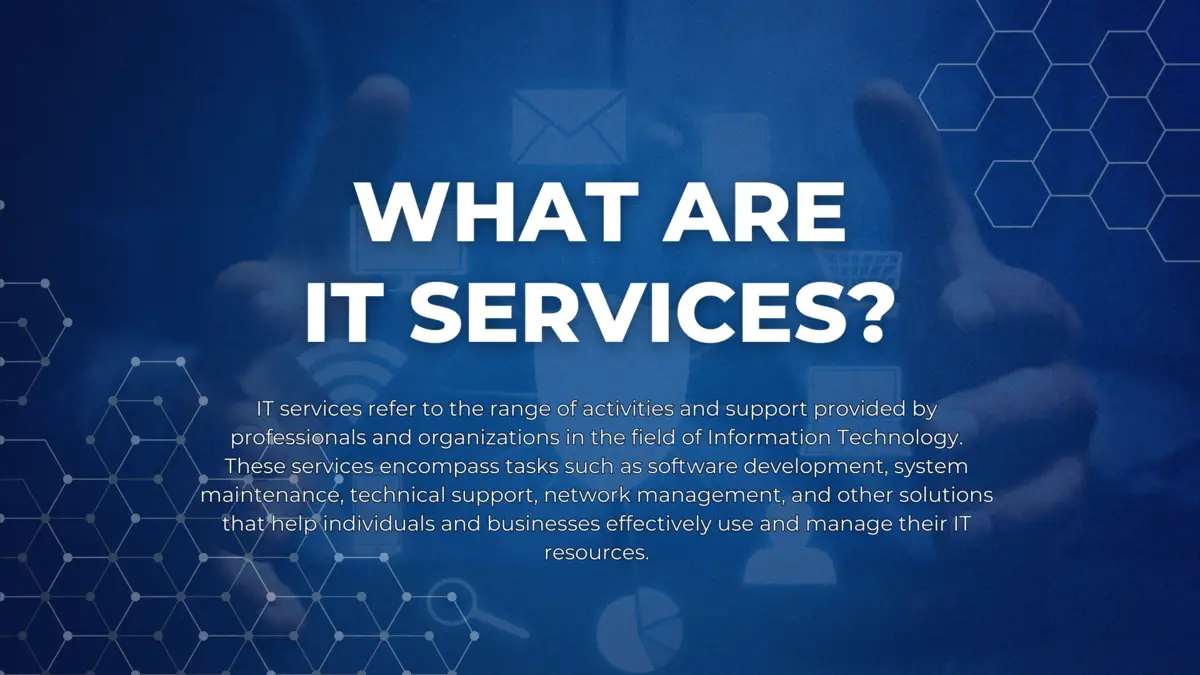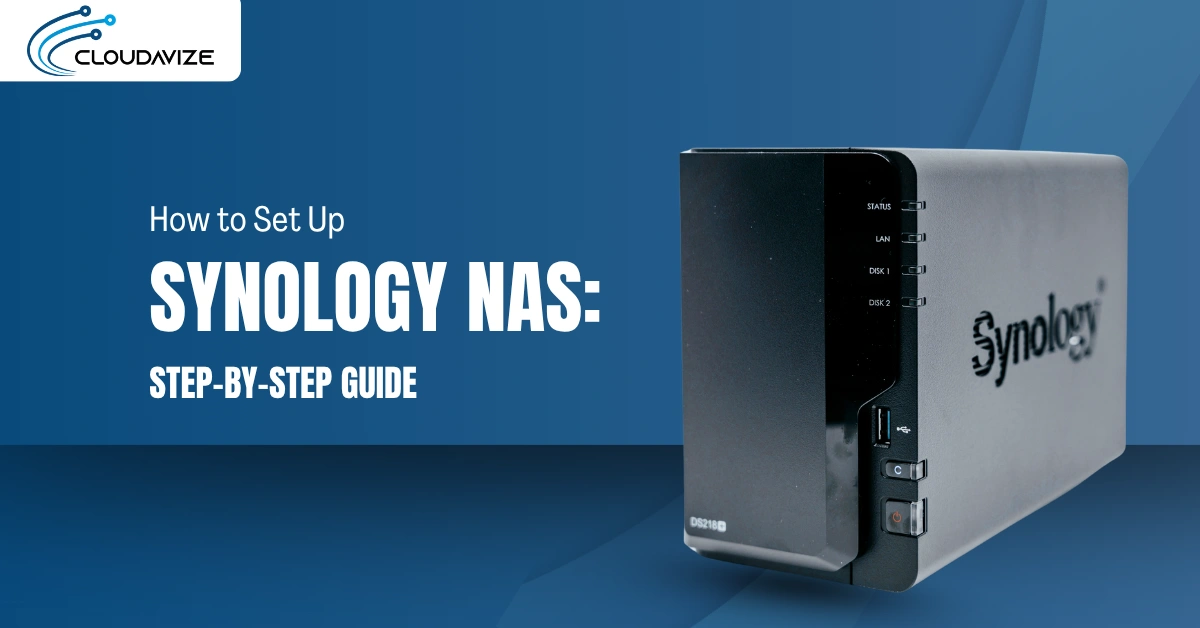IT Services can be defined as tools, managed programs, and services that allow computer systems and other Infrastructure Technology (IT) components to perform a certain task.
These services are vital facilitators of modern business technology solutions, helping to increase efficiency, productivity, and overall enhancement across various industries. Examples of IT services include IT support, managed IT services, cloud services, cybersecurity, and data backup and recovery. These services are essential for mission-critical functions, supporting operational efficiency, data security, and digital transformation across industries.
According to Statista, the IT services market is forecasted to reach $1,420 billion in 2024 and then increase to $1,839 billion in 2029, emphasizing its importance for modern businesses. As businesses increasingly rely on high-quality IT services to operate efficiently, these services provide a competitive advantage through process optimization and strategic technology integration across industries like finance, healthcare, e-commerce, and hospitality. For example, IT services enable digital banking platforms to operate and support fraud detection, as well as online shopping and supply chain management.
IT services are a critical part of Business Process Outsourcing (BPO), where companies transfer specific tasks to third parties called Managed Service Providers (MSPs) for optimized management. The growing demand for IT services is further reflected in the global managed IT services market, projected to reach nearly $372.6 billion by 2028, per Markets and Markets, driven by ongoing digital transformation efforts.
Table of Contents
11 Types of IT Services
The 11 primary IT service types that provide a competitive edge to businesses in terms of technical, operations, and strategic aspects include:
- IT Support
- Managed IT services
- Cloud Services
- SD-WAN Services
- IT Consulting
- Cybersecurity Services
- Data Backup and Recovery
- Network Services
- Communication Services
- Data Analytics
- IT Development
1. IT Support
IT support ensures all systems work by providing onsite or offsite help. It helps to maintain the ideal operation of all technology-based systems by troubleshooting issues. Examples include Helpdesk Support and Remote IT Support.
- Onsite Support: Solves technical problems at the client location, like hardware rectification or network setup and maintenance.
- Remote Support: IT assistance from afar, such as software bug-fixing or system upgrades.
2. Managed IT Services
Managed IT services refer to the practice of outsourcing management and maintenance responsibility for a company’s IT infrastructure. This service also offers support and ongoing monitoring, which massively increases operational efficiency. It helps improve operations through ongoing monitoring and tailored assistance.
Examples include 24/7 Monitoring for constant IT system supervision to maintain uptime and security. Managed Security offers comprehensive cybersecurity measures under one roof.
3. Cloud Services
Cloud services offer cloud-based solutions that let companies tap into distributed computing resources, increasing flexibility and productivity.
- Microsoft 365 Cloud Services: This includes a suite of productivity tools and collaboration services hosted in the cloud. Popular applications like Word, Excel, PowerPoint, Outlook, and Teams, along with OneDrive for cloud-based storage, are included. It helps streamline communication, collaboration, and document management.
- Microsoft Azure Cloud Services: It is the cloud computing platform that provides services such as virtual machines, databases, AI, analytics, and more. This highly flexible platform is easy to build and deploy. It helps manage applications through Microsoft’s global data center network. Examples include virtual machines and data analytics.
- Amazon Web Services: This comprehensive cloud platform offers computing power, storage options, and networking. It offers scalability, reliability, and a wide range of services for SMBs and large enterprises through Web Hosting and Cloud Storage facilities.
4. SD-WAN Services
SD-WAN (Software-Defined Wide Area Network) services optimize traffic flows across wide-area networks, improving connectivity and performance at a lower cost. It is a flexible, efficient, and cost-effective service best suited to connect dispersed locations like branch offices, data centers, and cloud resources. Major SD-WAN service providers are Cisco SD-WAN, VMware SD-WAN, and Fortinet Secure SD-WAN. Its main features include:
- Centralized Management: Ensures consistent administration of network resources
- Traffic Prioritization: Ensures critical business functions receive bandwidth first.
5. IT Consulting
IT consulting advises businesses on the best ways to use information services and technology to achieve business objectives. It provides businesses with expert advice, strategic guidance, and practical solutions to meet their goals and help them get the latest technology that aligns with their business. It focuses on providing core activities such as IT Strategy and Planning, Technology Implementation, IT Infrastructure, and Digital Transformation through services like ERP, Cloud Migration, Cybersecurity Risk Assessment, and Digital Strategy Development.
6. Cybersecurity Services
Cybersecurity services are fundamental for protecting an organization’s IT systems, networks, or data from cyberattacks or unauthorized access. According to Cybercrime Magazine’s report, cybercrime damages are expected to total $10.5 trillion annually by 2025, making robust security methods essential. To ensure data security and integrity, investing in protection cybersecurity measures like firewalls, intrusion detection systems, and encryption becomes essential.
Here are key services that fall under cybersecurity services:
- Vulnerability Scanning: Identifies known security vulnerabilities in systems and networks.
- Cloud Security: Protects data, apps, and resources in the cloud with tools such as encryption and identity and access management (IAM).
- Network Security: Protects data as it moves across networks, utilizing tools like firewalls and intrusion detection systems.
- Endpoint Security: Protects desktop, laptop, and mobile devices with antivirus software and endpoint detection and response solutions.
- Data Security: Protects an organization’s data from being tampered with, stolen, or destroyed through encryption and other security protocols.
7. Data Backup and Recovery
Data Backup and Recovery services ensure that crucial data is consistently backed up and can be restored if lost, maintaining business continuity. This service creates duplicates of your data and restores them in case of a system failure, cyberattack, or natural disaster, minimizing operational disruptions.
- Business Continuity Planning Services: Develop procedures to keep a business operating during service disruptions.
- Disaster Recovery Services: Restores IT services and data after a significant event, such as natural disasters or cyberattacks.
8. Network Services
Network services offer end-to-end solutions to manage, optimize, and support an organization’s network infrastructure. It includes network support, equipment servicing, site surveys, monitoring, and cabling.
- Network Support: Provides technical assistance to regularly and methodically manage network infrastructure with troubleshooting and optimization.
- Ubiquiti Networks: Provides various high-performance networking products like Ubiquiti UniFi and EdgeMax.
- Cisco Support: Provides assistance for Cisco networking products, including routers and switches.
- Wireless Site Survey: Designs wireless networks for optimal location and configuration.
- Monitoring Services: Monitors network components to quickly fix issues.
- Network Cabling Services: Involves activities related to installing, expanding, and maintaining network cabling infrastructure.
9. Communication Services
Communication Services, like Google Workspace, allow remote work and efficient communication inside and outside of a company, supporting remote work and enhancing overall productivity.
- VOIP (Voice Over Internet Protocol): Enables voice communication over the internet, providing a cheaper and more flexible solution than traditional phone lines.
- Mobile and Remote Networking: Employees can securely connect to their network from any location, increasing productivity and operational flexibility.
- Communication Management: Oversees an organization’s communication needs, ensuring effective channels and improved planning.
- Unified Communications: This concept combines all communication elements, such as voice, video, and messaging, into a common platform.
10. Data Analytics
Data analytics involves analyzing, cleaning, and transforming raw data into valuable insights to help discover patterns and support data-driven decision-making. It includes:
- Descriptive Analytics: Understands historical data patterns.
- Diagnostic Analytics: Analyzes the reasons behind past events.
- Predictive Analytics: Uses statistical models to forecast the future.
- Prescriptive Analytics: Recommends how to achieve desired results based on predictive analysis.
11. IT Development
IT development involves creating, implementing, and maintaining software and technology solutions tailored to meet specific corporate needs.
- Software Development: Builds systems and applications tailored to business demands.
- Web Development: Constructs and maintains responsive, user-friendly, and reliable websites and web apps.
- Application Development: Creates scalable and high-performing mobile or desktop applications.
- Systems Integration: Ensures different IT systems and software work harmoniously.
Ongoing Maintenance and Support: Provides ongoing maintenance and support to ensure developed solutions last longer.
Why are IT Services Important?
The six crucial attributes of IT services in modern business operations are enhancing efficiency, improving customer experiences, driving digital transformation, ensuring data security and compliance, reducing costs while maximizing ROI, and providing expert guidance and support.
- Enhancing Operational Efficiency– IT services streamline business processes by integrating systems and automating workflows, reducing manual errors and boosting productivity. Automation minimizes repetitive tasks, freeing employees to focus on strategic initiatives that drive growth. Additionally, IT services improve collaboration and communication within teams through advanced tools, facilitating remote work and adaptability in dynamic environments.
- Improving Customer Experience– Customer-centric IT services transform interactions into seamless and personalized experiences. CRM systems enable businesses to offer tailored and efficient solutions, enhancing customer satisfaction and loyalty. Self-service portals and automated tools empower customers to resolve issues independently, while data analytics provide valuable insights into customer preferences, helping businesses anticipate needs and improve service delivery.
- Driving Digital Transformation– Digital transformation leverages IT services to integrate advanced technologies across business operations. These services facilitate the adoption of new tools, ensuring businesses remain agile and innovative in competitive markets. Scalable solutions, such as cloud platforms, allow organizations to adapt to evolving demands, enhancing flexibility and fostering sustainable growth. By optimizing operations, IT services help businesses maintain a competitive edge in rapidly changing industries.
- Ensuring Data Security and Compliance– Robust data security and compliance measures protect sensitive business and customer information from breaches and cyberattacks. IT services implement advanced cybersecurity strategies, including real-time monitoring and proactive threat detection, to safeguard digital assets. Compliance with industry regulations such as GDPR and HIPAA is essential for avoiding legal penalties and maintaining trust, and IT services provide the necessary tools to meet these standards effectively.
- Reducing Costs and Maximizing ROI– IT services optimize infrastructure and streamline resource management, leading to significant cost savings. Continuous system monitoring ensures minimal downtime, preventing productivity loss and operational disruptions. Managed IT services also offer predictable costs, simplifying budgeting and enabling businesses to focus on core competencies while IT experts handle technical operations, maximizing return on investment.
- Providing Expert Guidance and Support– Expert guidance from IT service providers ensures businesses navigate the complex technology landscape with confidence. Strategic IT consulting helps align technology initiatives with business objectives, while seamless implementation ensures the smooth adoption of new systems. Proactive maintenance and ongoing support guarantee system reliability and efficiency, keeping businesses up to date with the latest IT trends and best practices.
What Are Future Trends in IT Services?
Emerging trends in IT services include the rise of cloud computing, heightened cybersecurity focus, integration of AI and machine learning, and a focus on user experience. These trends drive innovation, strengthen security, and enhance user interactions in the digital landscape.
1. Increased Adoption of Cloud Computing
Cloud computing is now fundamental to almost every organization, increasing productivity and encouraging innovation. According to Gartner, 40% of enterprises will use a “cloud-first but on-premises” approach by 2025 integrating services that complement existing data centers. Hybrid cloud implementations, such as those used by Target, unify on-premises and cloud data to enable real-time analytics for inventory management and personalized customer experiences.
This scalable approach lowers costs, providing businesses with the flexibility to deploy IT resources efficiently. For example, SaaS solutions like Microsoft 365 and Google Workspace empower remote teams, enhancing collaboration through cloud-based applications.
2. Growing Importance of Cybersecurity
As cyber threats become more pervasive, the importance of cybersecurity cannot be overstated. According to Veeam’s 2024 Global Report, 96% of ransomware attacks targeted backup repositories, and 27% of organizations fail to recover data even after paying ransoms. Advanced AI-powered tools like CrowdStrike Falcon analyze network traffic in real time, identifying anomalies and mitigating threats before they cause harm.
Organizations are increasingly employing AI and machine learning to bolster defenses. Biometric systems, such as Apple’s Face ID, enhance security by combining hardware and AI for multi-factor authentication, safeguarding sensitive data against unauthorized access.
3. AI and Machine Learning in IT Services
AI and machine learning are revolutionizing IT services by automating processes, enhancing decision-making, and improving service delivery. For instance, predictive maintenance systems powered by AI analyze operational data to forecast equipment failures, reducing downtime in manufacturing industries like General Electric.
AIOps (Artificial Intelligence for IT Operations) are pivotal for scaling IT services. According to Dynatrace, 90% of IT leaders believe that AIOps is essential for scaling DevSecOps. This is evident in solutions like IBM Watson Health, which utilizes machine learning to analyze patient data, enabling personalized treatment recommendations.
Additionally, customer service benefits from AI-driven chatbots like Azure Bot Services, which automate routine queries, improve response times, and enhance user satisfaction.
4. User Experience and Customer-Centric Services
Delivering IT services with a focus on user experience maximizes the value of technology for end users. Businesses with strong UX design see higher adoption rates and user loyalty. For example, e-commerce platforms like Amazon use AI-powered recommendation engines to personalize shopping experiences, increasing customer retention and sales.
In the banking sector, digital onboarding powered by AI streamlines the account creation process. Banks such as HSBC leverage real-time document verification tools, ensuring secure and seamless customer onboarding, enhancing user trust and satisfaction.



